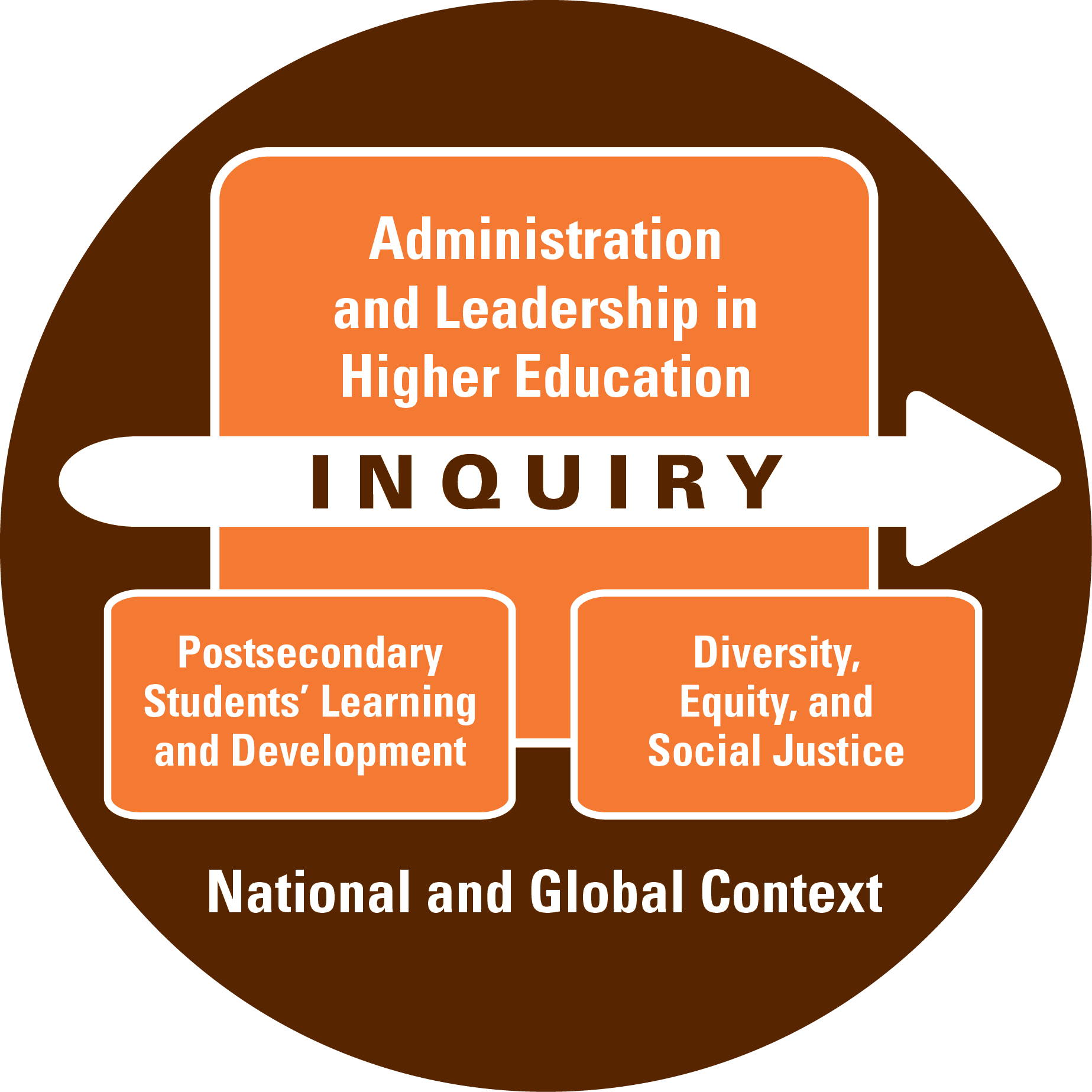Higher Education Administration (HIED) PhD Program
This nationally recognized Ph.D. program emphasizes informed, ethical decision making in the administration of higher education. It is intended to launch its graduates into new areas and/or higher levels of leadership in colleges and universities.

Students take core coursework in higher education foundations, administration, governance and organization, law, and postsecondary students in the United States.
The sequence of five research courses culminates in a dissertation of original contribution to the knowledge of higher education. Based on a cohort model, students’ professional and life experiences actively contribute to and enhance the learning experience in the classroom. The program is designed to be completed in three years for those pursuing full-time study. Required core and research courses are scheduled in the evening, allowing for greater flexibility for those maintaining full-time employment while in the program.
Most full-time students are employed in a variety of graduate assistantships that both support and supplement the program, and that typically provide a full tuition scholarship. The Global Understanding Requirement, a unique feature of the program, broadens and diversifies students’ conceptions of higher education and how it is influenced by culture and custom internationally.
The program is committed to educational leadership grounded in the following values:
- A zeal for involvement and advocacy in the higher education profession;
- A holistic perspective of higher education that reflects an understanding of the interests and concerns of the internal campus environment (its faculty, staff, students, and administrators), external constituents (consumers, governmental agents, the public), and the global community;
- Expertise in a discipline-based academic specialty, in addition to a command of a core of professional studies in higher education; appreciation for both quantitative and qualitative tools of inquiry, emphasizing an understanding of their application to an array of problems, challenges, issues, and practices in higher education.
HIED Learning Outcomes
Students are expected to integrate and synthesize content across domains. Learning outcomes are achieved through engagement in course work, independent research, employment, co-curricular and professional experiences, and interaction with faculty, peers, and university leaders.
Administration and Leadership in Higher Education
- Understand the history, philosophy, sociology, and law pertaining to governance, administration, and leadership in higher education institutions and systems
- Articulate how higher education is differentiated by mission, sector, curriculum, size, and stakeholders
- Evaluate and apply organizational theories and models to create and lead effective organizations
- Develop effective practices and policies to create socially-just higher education and institutions and systems
Postsecondary Students’ Learning and Development
- Understand the demographic profile and trends of college students in the U.S.
- Analyze and critique models and theories of student learning and development and understand the cultural factors that influence their creation and use
- Articulate the effect of individual and group differences and similarities on students' learning and development
- Create environments, policies, programs, and services that promote deep learning and foster the success of all students
- Collaborate within and beyond the institution to foster student learning, growth, and development
Diversity, Equity, and Social Justice
- Articulate the experiences of historically underrepresented and marginalized groups in higher education in the United States
- Understand issues of diversity, equity, and social justice in higher education
- Evaluate and create socially just policies and practices in higher education
- Understand a non-U.S. higher education system in the context of its culture
- Understand how U.S. higher education is similar to and different from other higher education systems
- Understand the role of globalization in higher education
Inquiry: Assessment, Evaluation, and Research
- Articulate paradigmatic assumptions that underlie different approaches to research, evaluation, and assessment
- Understand and interpret results from programmatic and institutional data
- Develop expertise in at least one research methodology
- Apply best practices of assessment and evaluation in postsecondary education
- Analyze qualitative and quantitative data to address research questions
- Evaluate the strengths and weaknesses of research and assessment studies
- Create and implement at least one assessment project and one research study
Learning Outcomes
Upon completion of the graduate degree, students in Higher Education Administration are expected to be able to:
- Administration and Leadership in Higher Education: Evaluate theories and models of organizations and leadership to achieve institutional mission and goals.
- Postsecondary Students’ Learning and Development: Assess and critique models and theories of student learning and development, informed by cultural factors that influence their creation and use.
- Diversity, Equity, and Social Justice: Evaluate campus policy and practice to promote diversity, equity, and social justice.
- Inquiry: Assessment, Evaluation, and Research: Design and execute a research study to address an important concern in higher education.
Accreditation and/or Program/Cluster Review
Bowling Green State University [BGSU] is accredited by the Higher Learning Commission. BGSU has been accredited by the Higher Learning Commission since 01/01/1916. The most recent reaffirmation of accreditation was received in 2022 - 2023. Questions should be directed to the Office of Institutional Effectiveness.
Professional Licensure (If applicable)
Bowling Green State University programs leading to licensure, certification and/or endorsement, whether delivered online, face-to-face or in a blended format, satisfy the academic requirements for those credentials set forth by the State of Ohio.
Requirements for licensure, certification and/or endorsement eligibility vary greatly from one profession to another and from state to state. The Higher Education Administration program does not lead to professional licensure.
Gainful Employment (If applicable)
Under the Higher Education Act Title IV disclosure requirements, an institution must provide current and prospective students with information about each of its programs that prepares students for gainful employment in a recognized occupation.
The Higher Education Administration program is not a recognized occupation that requires a Gainful Employment disclosure.
Updated: 12/03/2024 02:01PM
